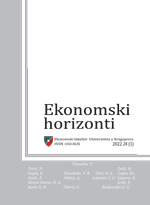SOCIAL ECONOMIC ASPECTS OF THE HUMAN SECURITY CONCEPT
Meri Boshkoska
The objective of this work is to analyze the real state in the field of the Macedonian Health and Social Policy, the pension system and human security at work. This type of analysis will make it possible to deduce certain conclusions and recommendations about accomplishing a higher level of general human security in the Former Yugoslav Republic of Macedonia. The results of this study enable us to conclude that, in the Former Yugoslav Republic of Macedonia, living expenses have been permanently increased, the unemployment rate is high and the average minimum wages paid in the region are the lowest, which all contributes to profound poverty in the country. It is also necessary to revise the laws and regulations in the field of workers’ health and security, make urgent changes in order to ensure the sustainability of the pension system and also start the reforms that will provide a sustainable and efficient health care system.
Keywords: pension system, social security, poverty rate, health care system
JEL Classification: I31, I32, H55




